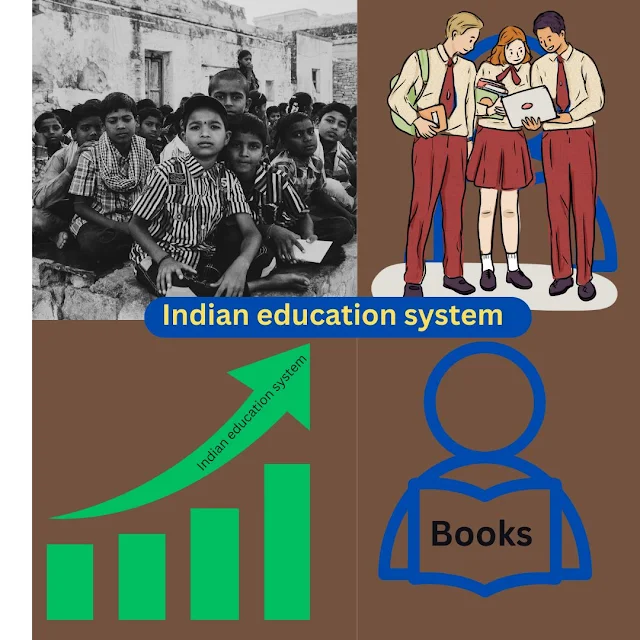Indian's education system is one of the largest in the world, with over 250 millions students enrolled in various levels of education. While the system has made significant progress in recent years, it still faces numerous challenges that hinder it's ability to provide quality education to all. In this blog, We will explore the current state of the Indian Education System, it's challenges & potential opportunities for growth.
#Current State of Indian Education System.
The Indian education system is divided into three main stages:
1.Primary Education(Class 1-5): Focuses on basic literacy and numeracy skills.
2.Secondary Education (Class 6-10):Emphasizes subject-specific knowledge.
3.Higher Education (Class 11-12 and beyond): Prepares students for university or vocational training.
Read more: The Issue of Tree Cutting in Delhi: A Call for Sustainable Urban Development
👉Visit my another website on blogger on single click on it.
# Challenges
1. Access and Equity: Disparities in access to quality education, particularly for marginalized communities.
2. Teacher Shortage: Inadequate teacher training and shortage of qualified teachers.
3. Curriculum: Outdated and rigid curriculum that fails to promote critical thinking.
4. Infrastructure: Inadequate infrastructure, including classrooms, libraries,and technology.
5. Assessment: Overemphasis on rote memorization and exams, rather than skills development.
#Opportunities
1.Digital Education: Leveraging technology to enhance learning experiences.
2. Skill Development: Focusing on vocational training and skill development.
3.International Collaborations: Partnering with global institutions to improve quality.
4.Reforms: Implementing policy reforms to address access, equity, and quality.
The Indian education system faces significant challenges, but there are also opportunities for growth and improvement. By addressing the challenges and leveraging opportunities, we can create a more inclusive, effective, and quality education system that prepares students for success in the 21st century.
FAQ:
1. Who were initiated Education in India?
Ans- The history of education in India dates back to ancient times, with various contributors:
1. Ancient Indian sages and seers: Developed the Vedas, Upanishads, and other scriptures that formed the basis of Indian knowledge and wisdom.
2.Gautama Buddha (563-483 BCE): Founded Buddhist education, emphasizing mindfulness, wisdom, and compassion.
3. Chanakya (350-283 BCE): Established the Takshashila University, one of the earliest known institutions of higher learning in India.
4. Ashoka the Great (304-232 BCE)_: Spread Buddhist education and established schools and universities throughout his empire.
5. _Mughal Emperor Akbar (1556-1605 CE)_: Introduced a comprehensive education system, including schools, colleges, and universities.
6. British colonial rule (1858-1947 CE): Introduced Western-style education, establishing schools, colleges, and universities, and shaping the modern Indian education system.
7. Mahatma Gandhi (1869-1948 CE): Emphasized the importance of education for India's independence and development, advocating for a more inclusive and vocational approach.
8. Jawaharlal Nehru (1889-1964 CE): As India's first Prime Minister, he prioritized education, establishing institutions like the Indian Institutes of Technology (IITs) and the National Council of Educational Research and Training (NCERT).
2. What are the importance of Education?
Ans- Education is essential for individuals, society, and the world at large. Here are some of the importance of education:
1. Personal Growth: Education helps individuals develop their critical thinking, problem-solving, and communication skills.
2. Empowerment: Education empowers people to make informed decisions, improve their socio-economic status, and participate in the democratic process.
3. Economic Development: Education contributes to economic growth by developing a skilled and productive workforce.
4. Social Mobility: Education helps individuals move up the social ladder, reducing poverty and inequality.
5. Improved Health: Education leads to better health outcomes, as educated individuals make informed decisions about their health and wellbeing.
6. Environmental Awareness: Education promotes environmental awareness, conservation, and sustainability.
7. Civic Engagement: Education fosters civic engagement, community participation, and social responsibility.
8. Innovation and Progress: Education drives innovation, technological advancements, and progress in various fields.
9. Global Understanding: Education promotes global understanding, cultural exchange, and international cooperation.

